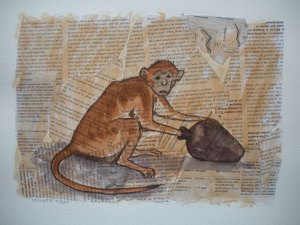I installed yWriter and have been playing around with it for the last two days. My initial impression is, I think it is an awesome tool for fiction writers.
Installing it was a cinch. No snags. I’m on a Windows 7 system. I’ve found the user interface to be quite intuitive.
Key features I love
– It’s completely free, and no adware!
– Each story you are working with is saved as a “project”. This allows all the data you enter for that story to be grouped in one central location. If you are anything like me, when I write I will often have tons of separate files for notes, scattered all over the place. Even though I create a separate directory for that particular story, I still wind up with tons of separate files in that directory; character sketches, working drafts, research notes on related topics, world-building notes, backstory, revisions, and so on. With yWriter, all of that and more is stored in one “project”, easily accessible, and searchable. This makes locating and cross-referencing a breeze.
– For each project/story, you create Chapters. For each Chapter, you create Scenes. When you are sitting down to write, you write the story scene by scene. I think this is a great method, breaking down the chapter into smaller chunks (scenes). Also, you don’t have to do this sequentially. For example, you could write scene 7 for chapter 9, and then scene 1 for chapter 1, or whatever chapter/scene you want to work on that session. You can also move scenes around by a simple drag and drop. Say you wrote scene 4 under chapter 3, and then later decided that scene really needs to be scene 1 for chapter 19. Drag/Drop, Bam, it’s done.
– Outlining. If you wanted to, you could outline your entire story even before writing the first scene. You could create blank chapters, and blank scenes within those chapters, then go to the notes section of each chapter and scene, and write a brief description (e.g. chapter 1 description; character x goes to the rodeo. Scene 1, she gets in her car, scene 2, she drives there, scene 3, she watches the show. Chapter 2…).
– Notes galore! I typically write a lot of notes when writing a story (like I mention up above). With yWriter, there are areas for notes in most sections you are in. So if you are looking at your character list, and click on a character, there is a note section for that character. Same with scenes, items, locations, and the overall project itself. It even includes an area where you can tag the date and time (in story time) for that scene, in case you need to track that to keep your story internally consistent. For each scene you can add what characters are in the scene, a scene description, and other helpful bits of metadata as well.
– Backup, backup, backup! There is a scene backup utility that automatically backs up a scene when you open it, and also automatically backs it up at regular intervals. You can set it to either backup as one file, or as sequential files. The author of the software recommends sequential files. This way, you have backups of previous drafts all along the way, in case you want to revert (you can view/restore old scenes). Additionally, titles, descriptions, character data and all the rest are also backed up automatically into a file, and a new one is created every time you open yWriter. Lastly, you can manually backup the entire project into a zip archive at any time.
– yWriter can export your project into several formats; HTML, Text, RTF, LaTex, Ebook. You can also export an Outline, Synopsis, and Scene Descriptions.
There are additional features as well, but these are the top hitters for me.
Official website: yWriter







